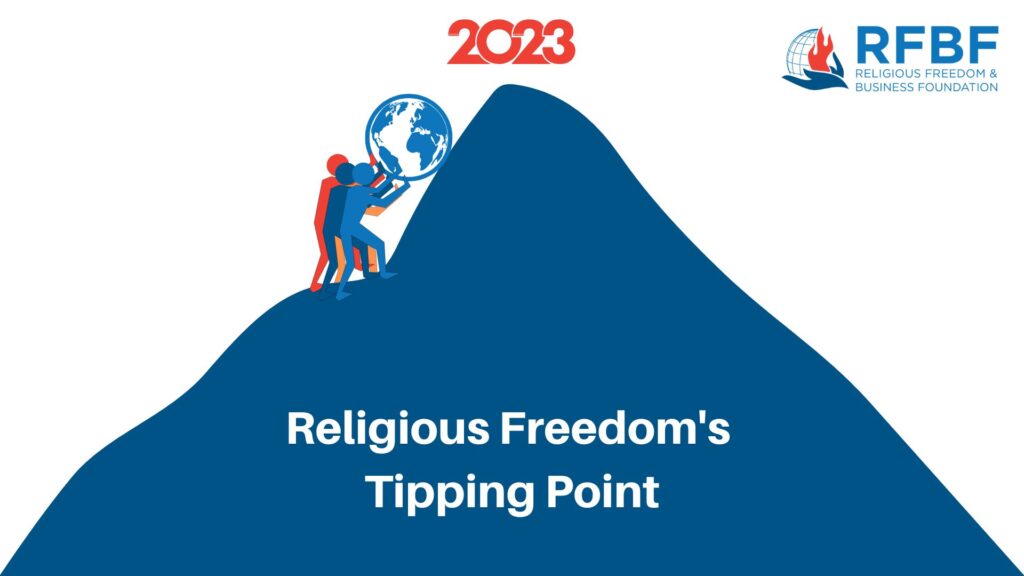 By Brian Grim, RFBF President
By Brian Grim, RFBF President
Malcolm Gladwell’s Tipping Point: How Little Things Can Make a Big Difference, written two decades before the covid pandemic, talked about how social change follows a similar pattern as epidemics. If he were writing the same book today, he might use China’s zero-covid policy that isolated its 1.4 billion people for nearly three years as the tipping point for the world to abandon authoritarian regimes as trusted supply chain partners.
Gladwell’s argument focused on three elements that create a “tipping point” – the point at which everything seemed an uphill struggle until suddenly the peak was reached and everything shifted into downhill mode. The elements are The Law of the Few, The Stickiness Factor, and The Power of Context.
For religious freedom, all three elements are converging in 2023. Let me give examples of each that I’ve seen in the lead up to 2023.
The Law of The Few
The first element in reaching a tipping point is that a few socially gifted people share knowledge, connect with social networks, and sell the idea.
In October 2022, Pat Gelsinger, the CEO of the Intel Corporation, urged corporations to place more emphasis on facilitating safe spaces for religion at work during Stanford University’s “The Role of Faith in Business in Silicon Valley” conference at the Rock Center.
While the event may not have made national headlines, Gelsinger’s ideas are contagious and leading other leaders to also speak out.
For example, when Gelsinger received the 2021 Global Business & Interfaith Peace Gold Medal from the Religious Freedom & Business Foundation for his enthusiastic support for religiously inclusive workplaces, his acceptance speech triggered another top corporate leader to respond. John Tyson, chairman of Arkansas-based Tyson Foods, to also spoke out on the importance of faith-friendly workplaces, referencing Pat Gelsinger.
In December 2022, I was in Silicon Valley for PayPal’s Interfaith Fair and Equinix’s Interfaith Holiday Luncheon and saw how this movement is spreading among top leaders and top companies.
Beyond companies, it is now even being argued for in influential business publications, including the Harvard Business Review in September 2022 by the influencer Simran Jeet Singh. And just yesterday in the nation’s premier human resource organization’s publication SHRM Executive Network: Are Your DE&I Efforts Missing This One Critical Component? – Faith, by brand expert Denise Lee Yohn.
The Stickiness Factor
The second element of a tipping point is that there is a quality that compels people to pay close, sustained attention to a product, concept, or idea. There is a change in the message that makes it more contagious or memorable.
For decades, religious freedom was something that was largely the providence of lawyers and court battles, everything from fights over zoning restrictions and grooming regulations to hot-button culture war issues that continue to be litigated up to the Supreme Court level.
However, the embrace of workplace religious freedom is a complete change in the message. It means that religious freedom is not just an issue for the few who are aggrieved but for absolutely everyone. From the Atheist to the Adventist and the member of Zion Baptist to the Zoroastrian, everyone has a stake in being able to bring their whole authentic self to work – faith/belief and all.
This is a paradigm shift – workplace “freedom of religion and belief” is a matter of consensus rather than contention. The consensus can be seen in that this is not just a Silicon Valley idea, but one being embraced by wide range of industries participating in the Corporate Religious Equity, Diversity & Inclusion (REDI) Index: retailers, airlines, financial institutions, manufacturers, insurers, defense contractors, and consulting groups.
Workplace religious freedom for all is a sticky idea because it does not make sense for people to check their faith — what for many is their deepest source of inspiration — at the door when they come to work. That’s a bad business idea.
The Power of Context
The Power of Context refers to the environment: if the historical moment is not right, then the tipping point will not likely take place.
I believe that the context is ripe. Corporations in the United States have been focusing on diversity, equity and inclusion (DEI) for decades, largely omitting religion and instead focusing on other important issues including race, gender, sexual orientation, abilities, age and even family, as our 2020 REDI Index report showed.
While the seeming omission of religion gives fuel to detractors who dismiss corporate diversity programs as nothing but a woke agenda, the DEI movement provides a context into which workplace religious freedom for all can naturally grow and be accepted.
And as mentioned already, the consensus that religion should be included is moving across industries, not just among those in Silicon Valley. This context not only allows religious freedom to be embraced in workplace, it means that millions of people are able to be involved in building religious freedom right in their own work environments.
Therefore, religious freedom is no longer defined as something fought about in courts and culture wars, but something that every person can work to build with colleagues of all faiths and beliefs for everyone’s benefit.
I expect 2023 to be a tipping point not just for freedom of religion and belief in the workplace but for such religious freedom across the country because where big business goes, society follows. And so does the world.
